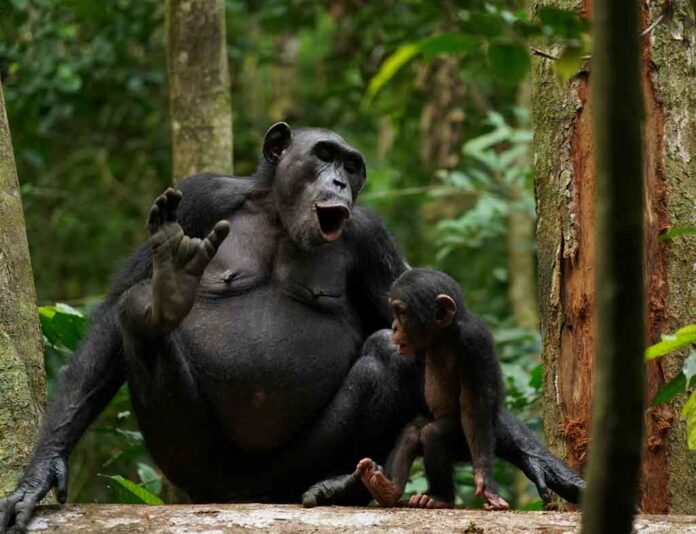
Chimpanzee, The Intelligent Primates, our closest living relatives, are fascinating creatures that share approximately 98% of our DNA. In this article, we explore the world of chimpanzees, uncovering their behaviours, habitats, and the conservation challenges they face.
Chimpanzees are highly intelligent primates belonging to the family Hominidae and the genus Pan. They are native to the forests of Central and West Africa and are known for their complex social behaviours and cognitive abilities.
Table of Contents
Classification and Types
• Common Chimpanzee (Pan troglodytes): Found in the forests of West and Central Africa, common chimpanzees are further divided into four subspecies.
• Bonobo (Pan paniscus): Also known as the pygmy chimpanzee, bonobos are found in the Democratic Republic of Congo and are known for their peaceful and matriarchal societies.
Habitat and Distribution
Chimpanzee, The Intelligent Primates inhabit a variety of forested habitats, including tropical rainforests, montane forests, and savannah woodlands. They are distributed across several African countries, including Cameroon, Gabon, Uganda, and the Democratic Republic of Congo.
Physical Characteristics
Chimpanzees have long, black hair covering their bodies, with bare skin on their faces, palms, and soles of their feet. They have opposable thumbs and toes, allowing them to grasp objects and manipulate their environment with precision.
Social Structure and Behaviour
Chimpanzee, The Intelligent Primates live in complex social groups known as communities, consisting of multiple individuals led by a dominant alpha male. They exhibit a wide range of social behaviours, including grooming, hunting, and territorial displays.
Diet and Feeding Habits
Chimpanzees are omnivorous, feeding on a variety of foods, including fruits, leaves, seeds, insects, and occasionally small mammals. They use tools such as sticks, rocks, and leaves to extract food and crack open nuts.
Reproduction and Family Life
Female chimpanzees give birth to a single offspring after a gestation period of approximately eight months. Infant chimpanzees are dependent on their mothers for care and protection, remaining with them for several years before reaching maturity.
Intelligence and Tool Use
Chimpanzees are renowned for their intelligence and ability to use tools. They have been observed using sticks to extract insects from termite mounds, rocks to crack open nuts, and leaves as sponges to drink water.
Threats to Chimpanzee, The Intelligent Primates
Chimpanzees face numerous threats in the wild, including habitat loss, poaching, disease, and human-wildlife conflict. Deforestation, illegal hunting for bushmeat, and the pet trade pose significant risks to their survival.
Conservation Efforts
Efforts to conserve chimpanzees include the establishment of protected areas, community-based conservation initiatives, anti-poaching patrols, and research projects aimed at understanding their behaviors and ecological requirements.
Role of Chimpanzees in Ecosystem
Chimpanzees play a vital role in their ecosystems as seed dispersers, helping to maintain forest biodiversity by dispersing seeds through their feces and shaping vegetation through their feeding habits.
Chimpanzees and Human Evolution
Studying chimpanzees provides valuable insights into human evolution, as they are our closest living relatives. By understanding their behaviours, genetics, and social structures, scientists can gain a better understanding of our evolutionary history.
Unraveling the Enigmatic World of North American Raccoons: Masked Bandits
Chimpanzee, The Intelligent Primates

FAQs
1. Can chimpanzees learn sign language?
Yes, chimpanzees have demonstrated the ability to learn and use sign language to communicate with humans and each other.
2. Do chimpanzees form lifelong bonds with other group members?
While chimpanzees form strong social bonds within their communities, these bonds can vary in intensity and may change over time due to factors such as dominance hierarchy and reproductive success.
3. Are bonobos more peaceful than common chimpanzees?
Bonobos are often described as more peaceful than common chimpanzees, as they exhibit lower levels of aggression and conflict within their societies.
4. Why are chimpanzees endangered?
Chimpanzees are endangered due to habitat loss, poaching, disease, and human-wildlife conflict, resulting from deforestation, illegal hunting, and the pet trade.
5. How can individuals help protect chimpanzees?
Individuals can support chimpanzee conservation efforts by donating to reputable organizations, raising awareness about the threats facing chimpanzees, and making sustainable choices to reduce their impact on the environment.












